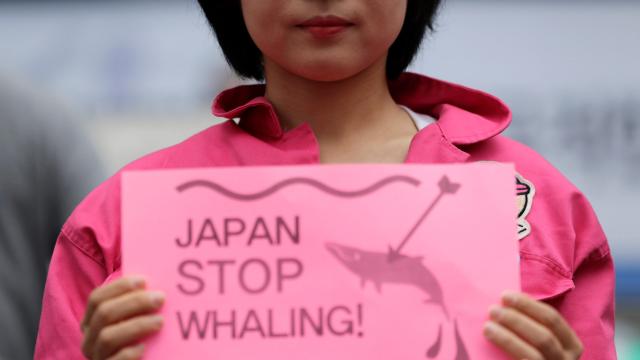Six months after announcing it would be breaking with the International Whaling Commission (IWC), Japan has officially resumed commercial whaling. Hundreds of whales will now be permitted to be hunted commercially each year in defiance of the IWC’s moratorium on the practice.
It’s been more than three decades since Japan permitted commercial whaling, although it has since killed thousands of whales for alleged scientific research purposes. Officials have touted the decision to leave the IWC as both a cultural and economic one, even as demand for whale meat simmers.
Japan’s Fisheries Agency is branding the move as part of a “basic policy of promoting sustainable use of aquatic living resources based on scientific evidence.”
During a ceremony to mark Japan’s return to whaling this week in Kushiro, Hokkaido, Shigeto Hase, director of the Fisheries Agency, said that “even though these resources can be used sustainably, and even though it should be obvious that individual nations’ food cultures should be respected, we could not see a path forward from countries that emphasise the protection of whales only,” E&E News reported.
The IWC is an international group established for the purpose of global whale conservation, of which most of the world’s nations are part.
Since 1986, the IWC has had a moratorium on commercial whaling. But the IWC does grant special whaling permits for scientific purposes, a kind of loophole that Japan has been accused of exploiting for decades.
Upon Japan’s initial announcement of the move in December, Chief Cabinet Secretary Yoshihide Suga claimed in a research.
Greenpeace in December slammed Japan’s decision to renege on its IWC commitments, claiming that its government attempted to bury the announcement during the end-of-year holidays.
Sam Annesley, Executive Director at Greenpeace Japan, challenged the government’s claim that some whale species’ populations are abundant, saying in a statement at the time that most populations “have not yet been recovered [from overexploitation], including larger whales such as blue whales, fin whales and sei whales.”
Hisayo Takada, Program Director of Greenpeace Japan said in a statement last month that while the organisation commends Japan for ending its whaling practices in the Antarctic, it’s a “a critical time for ocean protection.”
Sei whales are among three types of whale permitted to be hunted, along with minke and Bryde’s whales. According to numbers provided Monday by the Fisheries Agency, 25 sei whales, 52 minke whales, and a staggering 150 Bryde’s whale are permitted to be caught through the end of the year—227 total whales over a mere sixth-month span. The IUCN Red List categorizes sei whales as endangered.
Humane Society International on Monday released a scathing critique of Japan’s “research” and dubbed its whaling practices inhumane.
“This is a monstrous violation of global norms,” Humane Society International President Kitty Block said in a statement. “In direct violation of international standards and law, Japan has opened a new and infamous era of pirate whaling. Abandoning its decades-long charade of harpooning whales under the guise of science, it has revealed a terrible truth—that these gentle ocean giants are being slaughtered for no legitimate reason at all.”
